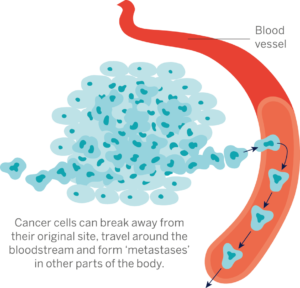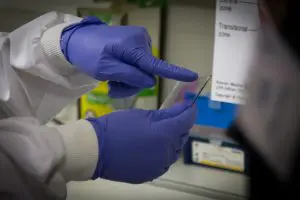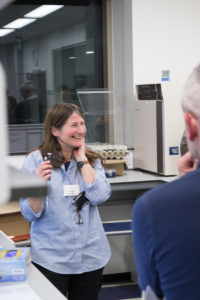The Spread of Prostate Cancer
Project Summary
About the Researchers
Dr Magali Williamson
Principal Investigator
Magali has been at King’s College London since 2014 and leads the Prostate Cancer Metastasis Group. Her main research interest lies in understanding how prostate tumours spread to other parts of the body and ways in which to block this process.
Dr Ritu Garg
Co-Investigator
Ritu obtained her PhD from Birkbeck College and the Ludwig Institute of Cancer Research in 2007. Her PhD focused on understanding the role of Rnd3, an atypical Rho-GTPase and its interaction with Rho-kinase, an important kinase involved in multiple signalling pathways. She arrived at Kings College London in 2007 working as a postdoctoral researcher in Professor Anne Ridley’s group. In 2019, Ritu joined Dr Magali Williamson’s group, in order to identify the role of Plexin-B1 and Ran GTPase in prostate cancer signalling and progression.
What is metastasis?
Cancer which starts in one place, such as the prostate, is called a primary tumour. In some cases, cells can break off the primary tumour and travel around the body. Locally advanced prostate cancer is cancer which has spread to the area just outside the prostate. When cells travel further, they can create new tumours in brand new sites. These are called secondary cancers or metastatic tumours, and the process is called metastasis.
It is after this process of metastasis, or spread, prostate cancer becomes advanced. Advanced prostate cancer is responsible for almost all deaths from prostate cancer.

The Research Project
Dr Magali Williamson’s team focuses on preventing the spreading of the cancer cells by investigating the cellular changes which underpin metastasis. They are interested in a protein, called Plexin-B1. In a healthy human, Plexin-B1 is involved in cell migration, and it is present in large quantities and often mutated in advanced prostate cancer.
PCR funded scientist Dr Magali Williamson talks about her work on a protein called Plexin-B1, to stop the spread of prostate cancer.
Backed by PCR, Dr Williamson and her team were responsible for a significant breakthrough in understanding the way that prostate cancer cells spread, when they discovered that Plexin-B1 is intrinsic to metastasis in prostate cancer.

The research team is now working to turn this exciting new knowledge into a new treatment for prostate cancer. They’ve proven that metastasis can be reduced by inhibiting Plexin-B1 with a type of protein called a polyclonal antibody. However, because Plexin-B1 has healthy functions as well, it doesn’t make sense to completely block it from working. The team are working on getting a better understanding of which functions of the protein are relevant to metastasis, so that they can develop a more specific, targeted therapy, which will be more effective and have fewer side effects than polyclonal antibodies.

Dr Magali Williamson at the PCR Lab Tour
Metastatic prostate cancer is responsible for almost all prostate cancer deaths. In fact, secondary cancer often kills more people than the primary tumour, across many different cancer types.
The therapies being developed by Dr Williamson’s team could contain early prostate cancer within the prostate and stop the cancer spreading further, which would dramatically improve the prostate cancer survival rate, and quality of life for men with prostate cancer.
This research has huge potential for families affected by all sorts of cancers, as this kind of breakthrough could lead to new ways to cut off the ability of many different types of cancer cells to spread.







